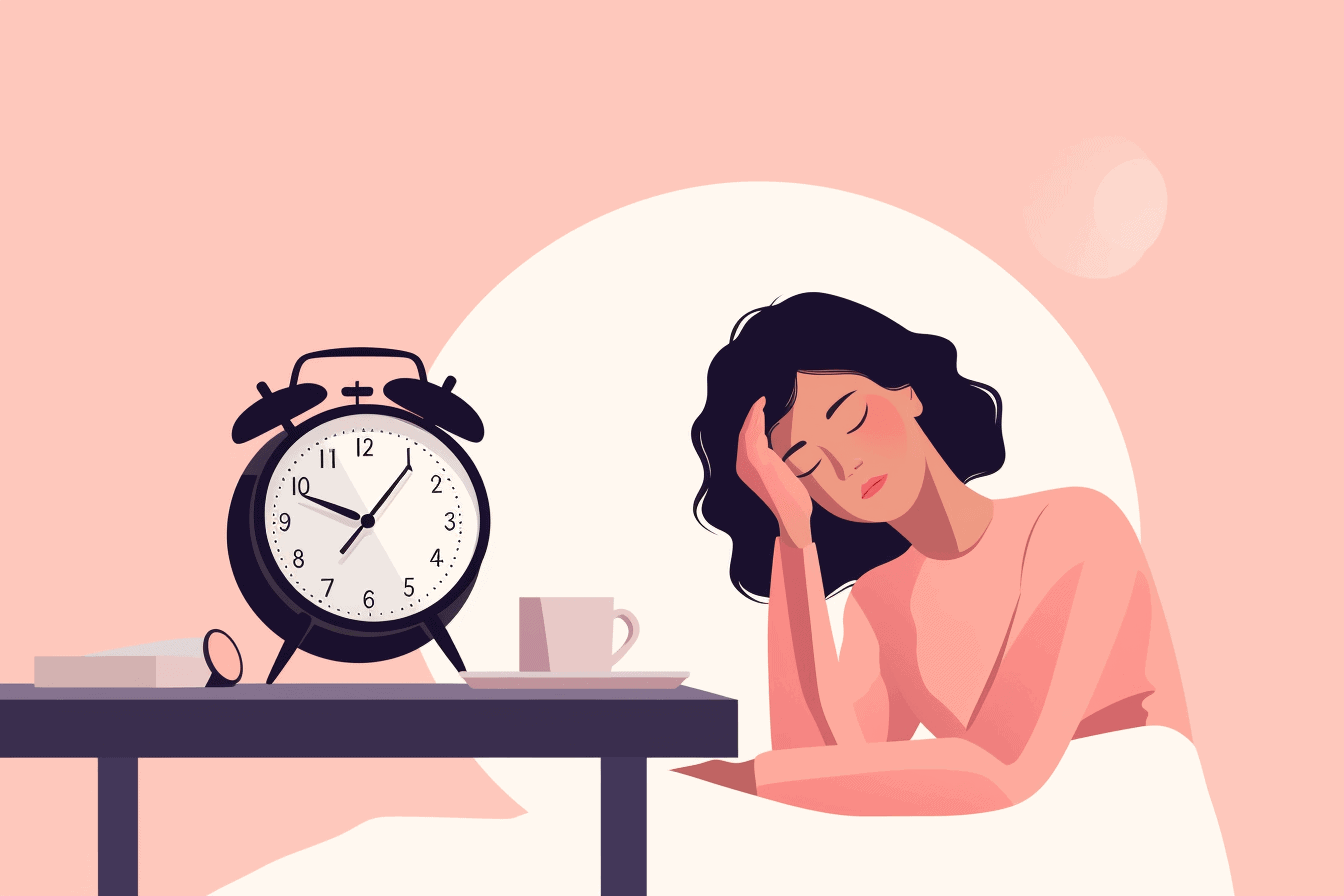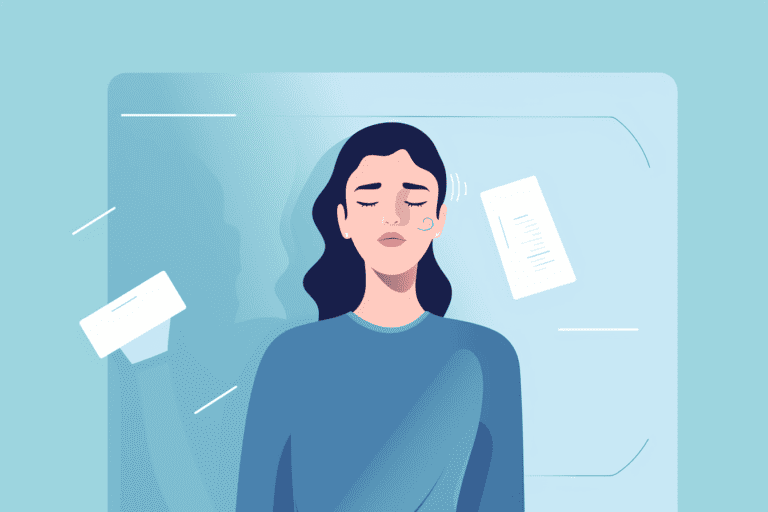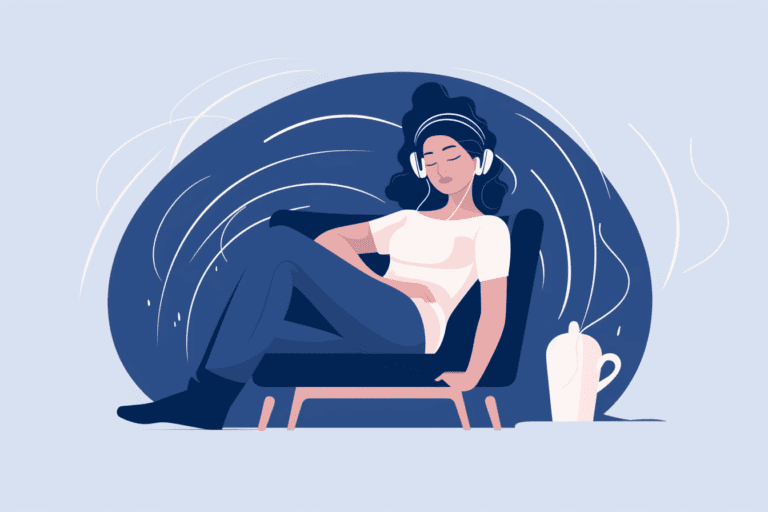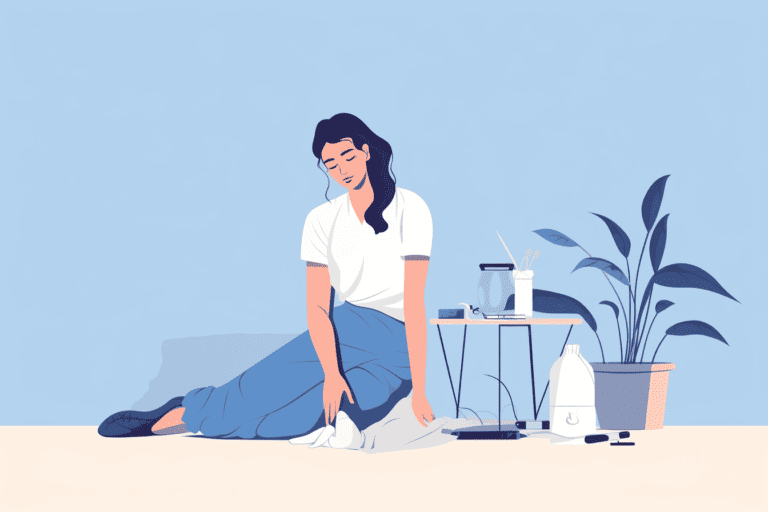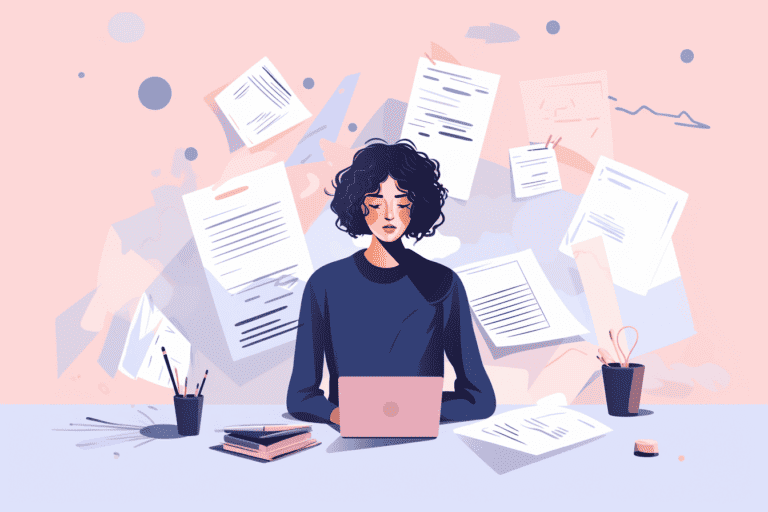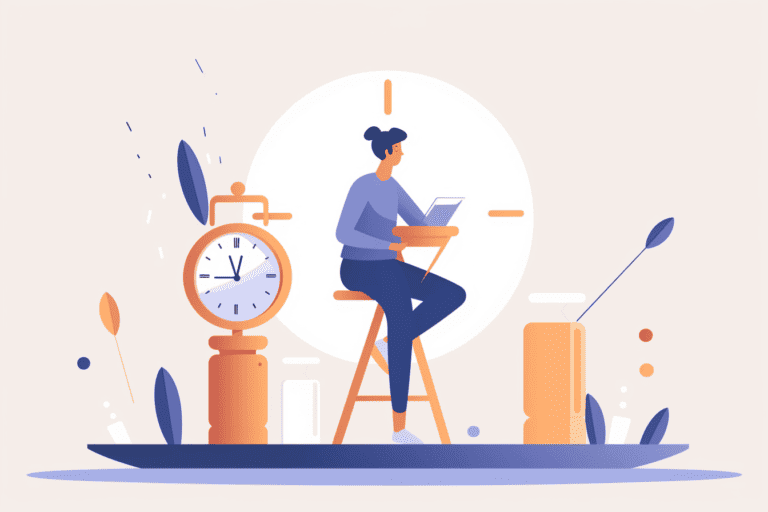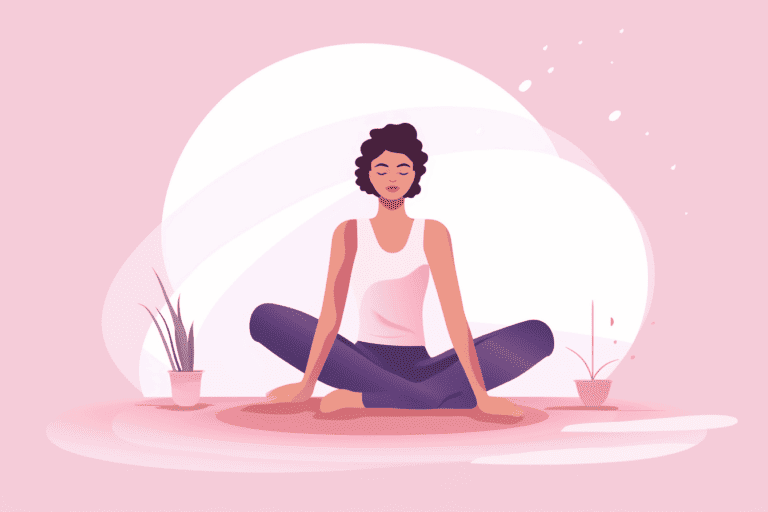ADHD Difficulty Waking Up in the Morning: Top Tips
Do you often find yourself locked in a never-ending battle with your alarm clock each morning?
If you have ADHD, this battle might feel all too familiar.
It’s not just about loving your cozy bed a bit too much – it’s about a brain-based difficulty in transitioning from one state to another, known as “state transition.”
Now, imagine rolling out of bed, feeling crisp and clear-headed, ready to conquer the day. Sounds wonderful, doesn’t it?
According to the American Sleep Association, about 75% of people with ADHD have sleep problems, including difficulty waking up.
This blog post is your first step to transform this seemingly impossible dream into a morning reality.
We’ll dive deep into the ‘why’ behind this common struggle among ADHD adults, offering practical, easy-to-implement strategies.
With these insights and actionable tips, this post will help you change your mornings from a battle against time to a harmonious start for a productive day.
So, if you’re tired of feeling like you’re constantly playing catch up, keep reading. The key to a smoother, more energized morning could be just a few lines away.

Why Do ADHD Adults Have Difficulty Waking Up in the Morning?
Adults with ADHD often have difficulty waking up in the morning due to a combination of delayed circadian rhythms, executive function challenges, and sensory sensitivities that can disrupt their ability to initiate a consistent wake-up routine.
Here are 11 key factors contributing to the struggles people with ADHD face when trying to wake up:
- Delayed Sleep Phase: Many with ADHD have an internal body clock that runs late, making it tough to rise early due to a delayed circadian rhythm. This is caused by melatonin, a hormone that regulates sleep.
- Struggles with Organization: Attention deficit hyperactivity disorder often brings difficulties with executive functions (executive function deficits), like planning and organizing. This can create challenges in sticking to regular sleep and wake-up times.
- Dopamine Dysregulation: In ADHD, there are imbalances in dopamine, a brain chemical that affects motivation and rewards. This can make mustering the motivation to wake up challenging.
- Interrupted Sleep: People with ADHD are prone to sleep disorders like insomnia, restless leg syndrome, and intrusive sleep issues. These can lead to sleep difficulties and make waking up even harder.
- Anxiety and Racing Thoughts: Anxiety is common among those with ADHD and can lead to racing thoughts at night, interfering with the ability to fall asleep and wake up refreshed.
- Revenge Bedtime Procrastination: Some with ADHD delay sleep timing to regain control over their leisure time. This can result in insufficient sleep, impacting wake-up routines.
- Sensory Sensitivities: Many ADHD individuals have heightened sensory sensitivities, making them more sensitive to environmental factors that can impact sleep quality and waking up.
- Time Distortions from Hyperfocus: Hyperfocus can distort time perception, making it difficult to go to bed as planned.
- Effects of Stimulant Medications: Some ADHD individuals take stimulant medication, which might affect sleep patterns and the ability to wake up in the morning.
- ADHD Morning Overwhelm: ADHD individuals often feel overwhelmed in the morning due to sensory, cognitive, and emotional challenges. This can make it tough to initiate activities, including waking up.
- Lack of Routine: Inconsistent routines due to ADHD-related challenges can disrupt sleep habits, making it harder to wake up at a consistent time.
Potential Consequences If you don’t Address Sleep & Wake-up Problems
You might be tempted to brush it off, thinking, “Yeah, it’s not a big deal. This is just how I am. I’ve got ADHD; it’s normal for me to have sleep issues. Why bother fixing something that’s just a part of me?”
But hold on a second! It’s not that simple. Sure, it might feel like a non-issue, but not addressing sleep and wake-up problems could lead to significant impacts on your life.
Think about it this way: you’re not just losing out on a few hours of daylight. Inconsistent sleep and wake schedules can affect your work productivity, your relationships, and most importantly, your health. Regular sleeplessness can lead to chronic issues like heart disease and diabetes.
And, it’s not just about the physiological effects. If you’re always waking up tired and lethargic, it’s pretty hard to keep up a positive attitude and face the day with enthusiasm. Your mood, cognitive abilities, and overall mental well-being take a hit too.
So no, this isn’t something you just brush off as a quirk of your personality.
It’s more serious than you think, and it’s time you address it.
So, let’s start taking those small steps towards better sleep and wake-up habits. Trust me, you’ll thank yourself later.
Now, let’s dig deeper into why it is so hard to fall asleep with ADHD in the first place.
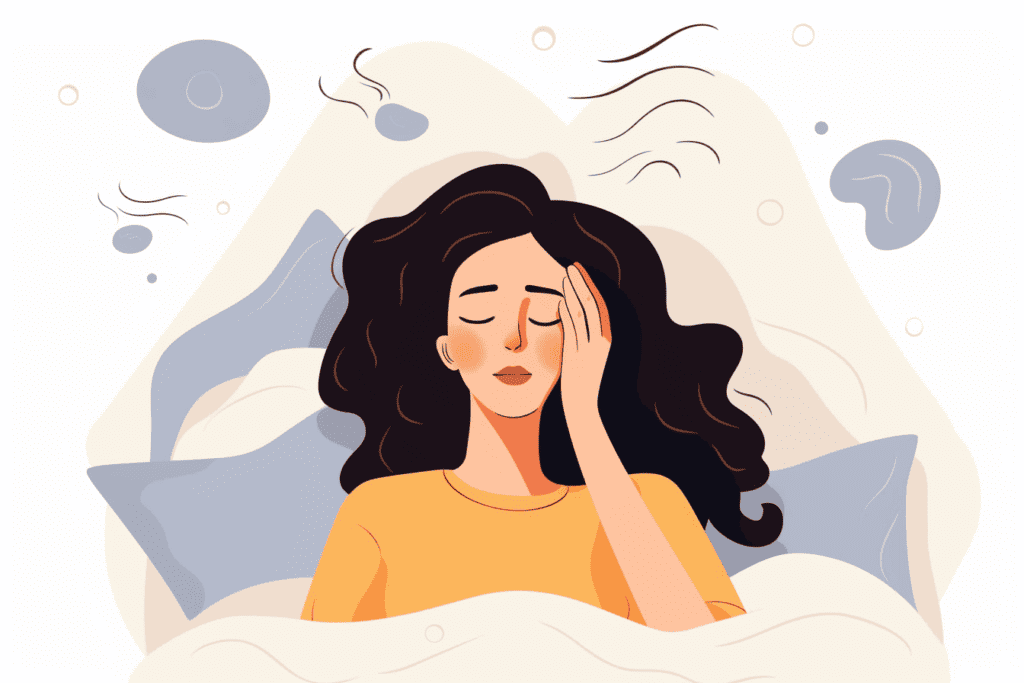
Why is it so hard for ADHD to fall asleep?
You know that feeling, right? The day’s work is done and you’re cozied up in your favorite pajamas, ready to get some good sleep. But then you remember that hilarious TikTok video you saved earlier.
One video transforms into a full-on scrolling marathon. Next thing you know, the clock’s struck 2am and you’re still laughing at dancing grannies and cute puppy compilations.
Frustrating, isn’t it?
You ask yourself, “Why on Earth can’t I just drift off?”
It seems as if your brain is throwing a never-ending party and sleep wasn’t invited. Below are a few reasons why.
ADHD related sleep problems
Delayed Sleep Phase
You know that internal body clock you have, called the circadian rhythm? It’s what tells you when it’s time to sleep and when it’s time to wake up.
Well, for many adults with ADHD, this internal clock runs a bit late, a condition called delayed sleep phase. This means you naturally feel more awake and alert later in the evening than most people do. This can lead to difficulty falling asleep at conventional bedtime hours.
Studies have linked this delayed circadian rhythm phase to sleep disorders like daytime sleepiness and even restless leg syndrome. It’s like your body is stuck in a different time zone, making it hard for you to drift off when you want to.
Dopamine Dysregulation
Dopamine dysregulation could be another culprit that’s keeping you from enjoying a good quality sleep. In people with ADHD, the dopamine system, which plays a key role in regulating sleep and wakefulness, often doesn’t function as it should. This can lead to poor sleep quality and make it tough to fall asleep or stay asleep.
Racing Thoughts and Overthinking
When it comes to ADHD, your brain tends to race at a mile a minute. This hyperactivity of thoughts is a common symptom of ADHD and can lead to problems with sleep. If you’re struggling with a constantly running mind, you’re not alone.
Many adults with ADHD report a similar experience. This overthinking, or “racing thoughts,” can make it challenging to settle down and drift off to sleep, despite how tired you might be.
Caffeine and Stimulants
For those with ADHD, caffeine and stimulants can significantly disrupt your sleep wake cycle. You may rely on these substances to help navigate a busy day, but they can lead to difficulty falling asleep and staying asleep at night.
Studies, like this one from Johns Hopkins School of Medicine, have shown that caffeine can delay the timing of your body clock, leading to problems falling asleep at night and restless sleep.
This could make your morning routine a struggle as difficulty waking up becomes a common issue. When it’s time to get out of bed, you might find yourself feeling groggy instead of refreshed, due to the sleep disturbance caused by these stimulants.
Also Read: Why Does Coffee Make Me Sleepy ADHD
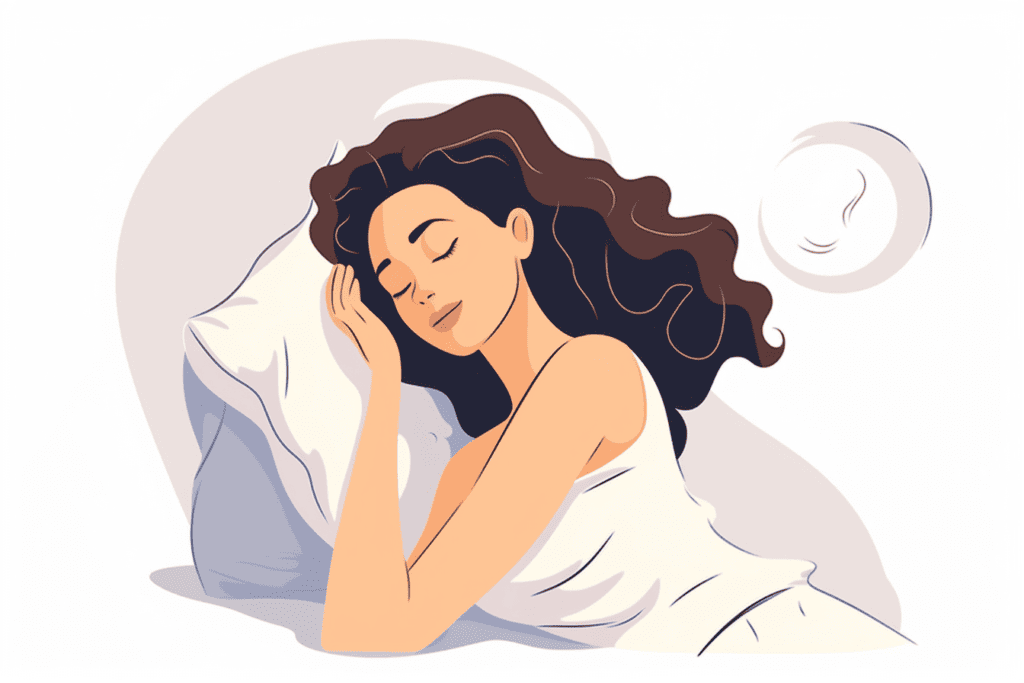
Useful Tips to Have Quality Sleep for ADHD
Let’s first try to tackle the root cause and look at some of the best tips to help you with your sleep problems.
1. Prioritize Consistent Bedtime Routine
To develop good sleep hygiene, maintaining a consistent sleep schedule can be a real game-changer. Try going to bed and waking up at the same time every day. Yes, even on weekends! This can help regulate your sleep wake cycle and reduce problems falling and staying asleep.
2. Create a Relaxing Bedtime Routine
Establishing a personalized bedtime routine can greatly enhance the quality of your sleep. Deliberately include calming activities, such as reading or indulging in a soothing bath, before you retire for the night. This practice can facilitate easier sleep onset and alleviate any disruptions you may be encountering during your rest.
3. Limit Screen Time
Minimize your screen time before bed. The blue light emitted by your devices may cause sleep disturbance, making it difficult to fall asleep. Aim to disconnect at least an hour before bed. This will help you wind down and have a restful sleep.
4. Utilize Sleep Tracking Apps
Leverage sleep tracking apps to monitor your sleep patterns. Apps like SleepScore or Sleep Cycle can provide valuable insights into your sleep wake cycle. They can help identify any disruptions preventing you from falling asleep or staying asleep, guiding you to make effective adjustments for better sleep.
5. Take Melatonin supplements for regulating sleep-wake cycle
Consider taking Melatonin supplements to combat difficulty sleeping and restlessness at night. It’s a natural hormone that your body produces when it’s time to sleep.
As an adult with ADHD, your brain may not produce enough of it. Melatonin can help stabilize your sleep-wake cycle, leading to a better night’s sleep.
Just make sure to consult with your physician on its compatibility with any ADHD medications you’re currently taking. With appropriate dosage and timing, you may notice a significant improvement in your sleep quality.
6. Journal or “Brain dump” before Falling Asleep
Struggling with a racing ADHD brain at night? Consider ‘braindumping’ or journaling before sleep. This practice helps offload thoughts that may be disrupting your sleep.
Just jot down worries, to-dos, or random thoughts that pop into your mind. You might find it easier to fall asleep and attain a better night’s sleep.
7. Try White Noise, Brown Noise or Soothing Music
If you’re a night owl dealing with sleep deprivation, try using white noise, brown noise, or soothing music. These sounds can mask sleep disruptions, helping your ADHD brain relax and ushering you into a good quality sleep. Experiment to find what works best for you.
8. Manage Your Sleep Environment
To enhance the sleep environment, you could invest in a quality mattress and pillows that suit your comfort preferences. Try using essential oils like lavender to create a calming atmosphere.
Temperature control is crucial too – maintain a cool and comfortable room temperature, around 60 to 67 degrees Fahrenheit, for optimal sleep.
9. Try Weighted Blankets
For improved sleep, consider switching to a weighted blanket. These blankets, filled with small weights, provide a soothing, gentle pressure that mimics a comforting hug. This can help calm the mind, easing you into a deeper, more restful sleep.
10. Incorporate Mindfulness Techniques
Try adding mindfulness techniques to your bedtime routine. Regular practice of mindfulness meditation or progressive muscle relaxation can help manage racing thoughts that can impact sleep. For instance, a simple five-minute meditation before sleep can make a significant difference.
11. Use Smart Home Technology
To enhance your sleep quality, utilize smart home technology. Specifically, a smart thermostat can maintain an ideal temperature in your room, promoting better sleep.
Simply set it to a cooler setting at bedtime, as studies suggest a cooler environment fosters restful sleep. This simple change can greatly improve your bedtime routine and sleep comfort.
12. Explore Sleep-Enhancing Gadgets
Try sleep-enhancing gadgets such as this pillow with bluetooth for improved sleep. This specific type of pillow plays rich, soothing melodies through a unique system, designed to calm your nervous system and promote restful sleep. Connect it to your phone via the included Bluetooth amplifier to enjoy any music you like. It’s perfect for ADHD adults striving for better sleep quality.
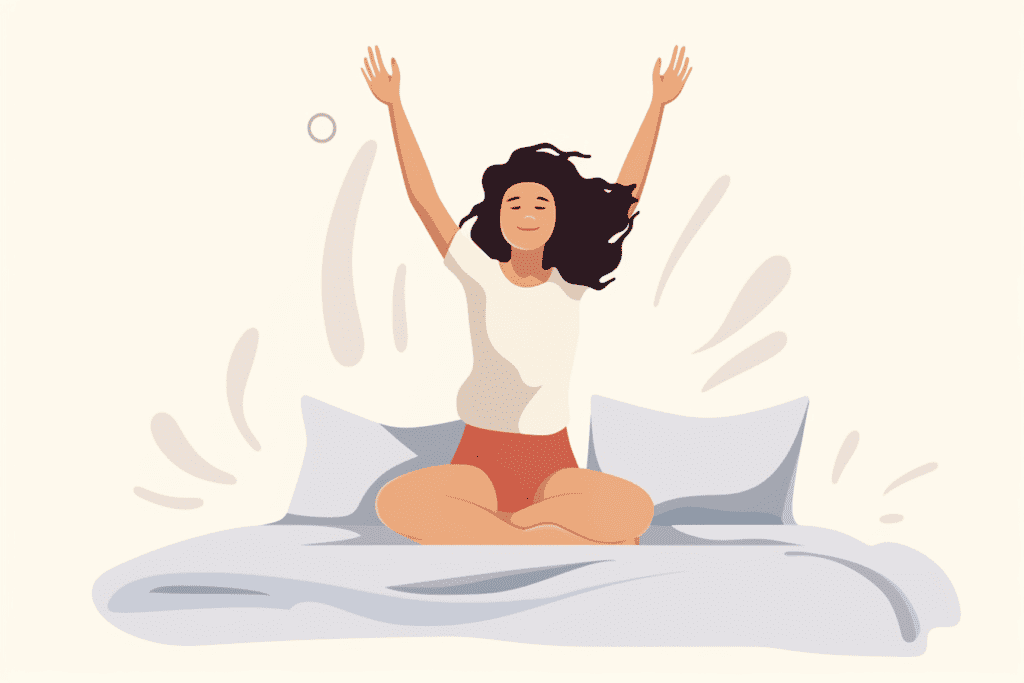
Useful Tips For ADHD to Wake Up
If you’ve addressed the sleep problems, waking up shouldn’t feel that difficult for you anymore. But if you’re still having a hard time getting out of bed, here are a few useful tips for you:
1. Set Multiple Alarms
Setting multiple alarms is an effective strategy to ensure you don’t oversleep. Place alarms at different spots in your room, forcing you to physically get up to turn them off. Choose varying alarm tones, so your brain doesn’t get accustomed to just one sound, thereby increasing your chances of waking up. Here’s one technique that you can try:
The Two-Alarm System
Here’s how it works:
Set two alarms. The first one is placed away from your bed. When this alarm rings, you have to get up to turn it off. This helps you shake off sleepiness.
The second alarm is closer, just in case. It’s like having a backup to make sure you stay awake and don’t snooze back to sleep.
It’s that simple!
2. Try Smart Alarm Apps and Gadgets
Apps:
Wake up more refreshed with apps like “Sleep Cycle” or “Smart Alarm Clock,” which analyze your sleep patterns and wake you during light sleep phases. This can prevent morning grogginess, leaving you sharper and more alert for the day ahead.
Gadgets:
Bright Light Therapy Alarm Clocks
Invest in a light therapy alarm clock that gradually brightens like a natural sunrise. This helps sync your body clock and makes waking up feel gentler. It involves exposing yourself to a bright light, often mimicking natural sunlight, especially during the morning. This sunrise alarm clock helps regulate your body’s internal clock, making it easier to wake up and feel more alert.
Wearable Fitness Trackers
Opt for a fitness tracker with a silent, vibrating alarm. This way, you wake up without disturbing others. It’s a subtle yet effective method to start your day on a positive note.
3. Get Sunlight Exposure
Embrace the morning sun or well-lit spaces to regulate your body clock. Natural light triggers wakefulness and resets your internal rhythm. Whether it’s enjoying your coffee outdoors or soaking up rays by a window, this simple step jumpstarts your day.
4. Create a Morning Routine
Craft a morning routine that’s exciting for you. It could involve stretching, savoring a cup of tea, or reading a chapter of your favorite book. This personalized routine can make mornings more enjoyable and motivate you to rise and shine.
5. Use Positive Reinforcement
Celebrate waking up on time with a small reward. Treat yourself to a delicious breakfast smoothie or enjoy a short moment of meditation. This positive reinforcement strengthens your commitment to early mornings.
Final Thoughts
In this blog post, we addressed ADHD difficulty waking up in the morning due to sleep disturbances, circadian rhythm disruptions, and the impact of stimulant medications on sleep quality.
But to all my fellow ADHD-ers out there, I want you to know – mornings might be tough, but so are we. They might come with their own unique set of challenges, but remember, you are not alone in this.
Just as every car needs a key to start, each person with ADHD has their own unique ‘key’ to kick-start their mornings. The trick is to find what works for you.
It might be a quirky alarm clock or a breakfast so delicious that it lures us out of our cozy cocoons.
No matter the struggle, just remember, the struggle to get out of bed doesn’t define you or your day. You’re stronger than the urge to hit snooze. So here’s to celebrating those small victories, one sunrise at a time!

